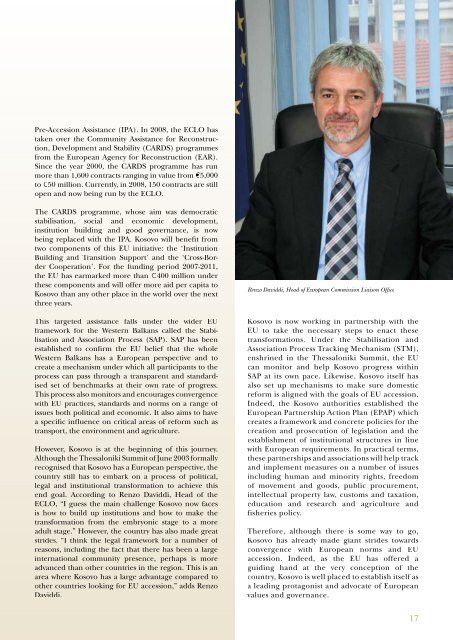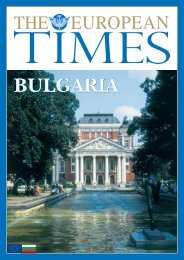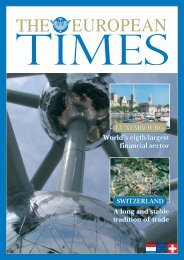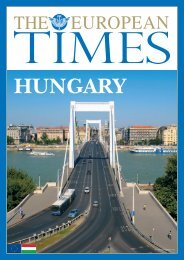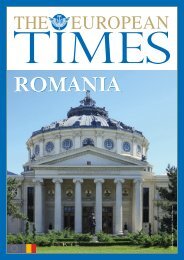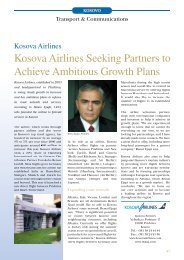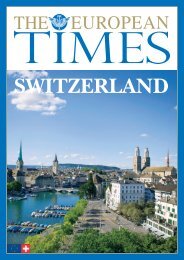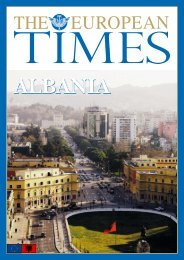Download Kosovo Report - The European Times
Download Kosovo Report - The European Times
Download Kosovo Report - The European Times
You also want an ePaper? Increase the reach of your titles
YUMPU automatically turns print PDFs into web optimized ePapers that Google loves.
Pre-Accession Assistance (IPA). In 2008, the ECLO has<br />
taken over the Community Assistance for Reconstruction,<br />
Development and Stability (CARDS) programmes<br />
from the <strong>European</strong> Agency for Reconstruction (EAR).<br />
Since the year 2000, the CARDS programme has run<br />
more than 1,600 contracts ranging in value from €5,000<br />
to €50 million. Currently, in 2008, 150 contracts are still<br />
open and now being run by the ECLO.<br />
<strong>The</strong> CARDS programme, whose aim was democratic<br />
stabilisation, social and economic development,<br />
institution building and good governance, is now<br />
being replaced with the IPA. <strong>Kosovo</strong> will benefit from<br />
two components of this EU initiative: the ‘Institution<br />
Building and Transition Support’ and the ‘Cross-Border<br />
Cooperation’. For the funding period 2007-2011,<br />
the EU has earmarked more than €400 million under<br />
these components and will offer more aid per capita to<br />
<strong>Kosovo</strong> than any other place in the world over the next<br />
three years.<br />
This targeted assistance falls under the wider EU<br />
framework for the Western Balkans called the Stabilisation<br />
and Association Process (SAP). SAP has been<br />
established to confirm the EU belief that the whole<br />
Western Balkans has a <strong>European</strong> perspective and to<br />
create a mechanism under which all participants to the<br />
process can pass through a transparent and standardised<br />
set of benchmarks at their own rate of progress.<br />
This process also monitors and encourages convergence<br />
with EU practices, standards and norms on a range of<br />
issues both political and economic. It also aims to have<br />
a specific influence on critical areas of reform such as<br />
transport, the environment and agriculture.<br />
However, <strong>Kosovo</strong> is at the beginning of this journey.<br />
Although the <strong>The</strong>ssaloniki Summit of June 2003 formally<br />
recognised that <strong>Kosovo</strong> has a <strong>European</strong> perspective, the<br />
country still has to embark on a process of political,<br />
legal and institutional transformation to achieve this<br />
end goal. According to Renzo Daviddi, Head of the<br />
ECLO, “I guess the main challenge <strong>Kosovo</strong> now faces<br />
is how to build up institutions and how to make the<br />
transformation from the embryonic stage to a more<br />
adult stage.” However, the country has also made great<br />
strides. “I think the legal framework for a number of<br />
reasons, including the fact that there has been a large<br />
international community presence, perhaps is more<br />
advanced than other countries in the region. This is an<br />
area where <strong>Kosovo</strong> has a large advantage compared to<br />
other countries looking for EU accession,” adds Renzo<br />
Daviddi.<br />
Renzo Daviddi, Head of <strong>European</strong> Commission Liaison Office<br />
<strong>Kosovo</strong> is now working in partnership with the<br />
EU to take the necessary steps to enact these<br />
transformations. Under the Stabilisation and<br />
Association Process Tracking Mechanism (STM),<br />
enshrined in the <strong>The</strong>ssaloniki Summit, the EU<br />
can monitor and help <strong>Kosovo</strong> progress within<br />
SAP at its own pace. Likewise, <strong>Kosovo</strong> itself has<br />
also set up mechanisms to make sure domestic<br />
reform is aligned with the goals of EU accession.<br />
Indeed, the <strong>Kosovo</strong> authorities established the<br />
<strong>European</strong> Partnership Action Plan (EPAP) which<br />
creates a framework and concrete policies for the<br />
creation and prosecution of legislation and the<br />
establishment of institutional structures in line<br />
with <strong>European</strong> requirements. In practical terms,<br />
these partnerships and associations will help track<br />
and implement measures on a number of issues<br />
including human and minority rights, freedom<br />
of movement and goods, public procurement,<br />
intellectual property law, customs and taxation,<br />
education and research and agriculture and<br />
fisheries policy.<br />
<strong>The</strong>refore, although there is some way to go,<br />
<strong>Kosovo</strong> has already made giant strides towards<br />
convergence with <strong>European</strong> norms and EU<br />
accession. Indeed, as the EU has offered a<br />
guiding hand at the very conception of the<br />
country, <strong>Kosovo</strong> is well placed to establish itself as<br />
a leading protagonist and advocate of <strong>European</strong><br />
values and governance.<br />
17


